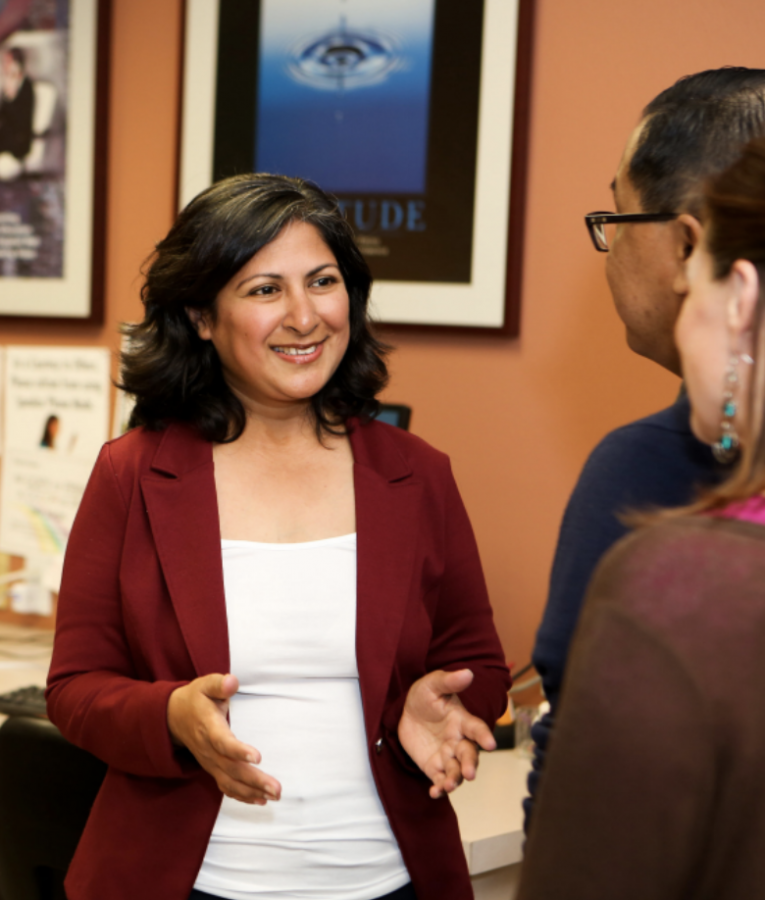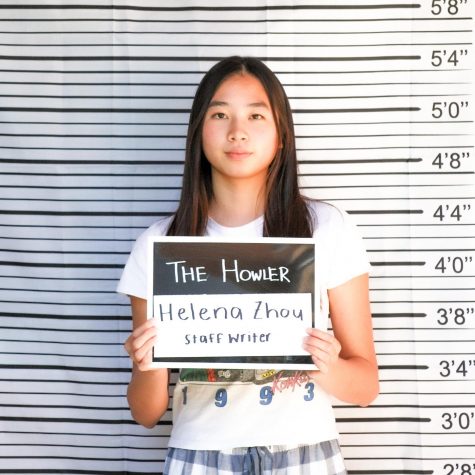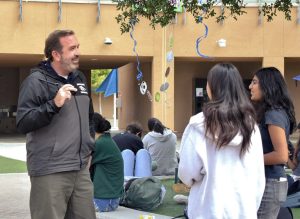New Mayor Farrah Khan on COVID-19 and civil rights
LOOKING FORWARD: Farrah Khan pushes for a progressive Irvine.
January 7, 2021
Newly elected Mayor Farrah Khan looks to lead Irvine towards a brighter future that promotes social justice reform, environmental sustainability and economic revitalization. As an advocate of government transparency and inclusionary housing among other issues, she hopes to get started on her plans as soon as she is sworn in.
The Howler: Why did you choose to run for mayor?
Farrah Khan: I wasn’t planning on running for mayor, but as conflicts arose in our city, especially regarding social justice issues, it became apparent that we didn’t have leadership that understood the changing demographics in the city.
When people were calling the coronavirus the Chinese virus on a national level, I was the one that brought forward a resolution to stand against that threat of hate. At the same time, we had our Black Lives Matter protests, many of which were actually led by our Irvine students, all of which the police claimed had been peaceful. But then, the leaders in our community released statements about disliking violence and protests in our cities when it’s actually our First Amendment right to protest. And these things kept happening over and over again, such as when our black community members were told to find another city to live in if they didn’t like it here.
It was just unacceptable. It was the last straw for me, and I recognized that we needed leadership that is going to be understanding of problems within our community and how to work through those problems.
I had the opportunity to hold a roundtable discussion with several of our black community members and our police. In those conversations, we talked about housing equity, education, what it feels like for them when they get pulled over and how we can set up a speaker series for our officers. And that’s how we build bridges within our communities. That’s how we fix our issues: by bringing people to the table, not shutting them out.
TH: What do you plan to work on in addition to social justice?
FK: We’re currently working on a diversity, equity and inclusion resolution that I hope we’ll be bringing forward soon. It will reach out to those who normally wouldn’t seek employment at the city level and businesses that don’t know how to apply for government contracts. We’re essentially providing an equity base for them.
Outside of that, dealing with this pandemic and the economic crisis that followed it is a high priority. Right now, I’ve got staff looking into data on exactly how many community members are facing housing insecurity, whether they’re able to pay their rent or mortgage and how many of our small business owners are at the brink of closing down their shops. We want to make sure that we’re reaching out to our state and federal legislators, bringing those dollars back locally and helping people get through this pandemic so that we can come out of it stable both in terms of health and finance.
I’m excited about the Community Choice Energy moving forward and our Climate Action Plan recently being approved. We’re working to ensure the reduction of greenhouse gas emissions, energy and water usage and overhauling our city as far as where we can improve, whether it’s in our buildings or on our streets.
TH: What changes would you like to implement in our educational system here in Irvine?
FK: My son is currently in Irvine Virtual Academy, and as a parent, I’d like to see our educational system really empathize with the needs of the students right now. Even though I can’t directly impact education, I can help bring education to the forefront by bringing students voices in at the council level, and I meet with the elected school board on a regular basis. Right now, I’m planning to start up a Student Advisory Council under the mayor’s office to get input from students on what changes they want to see.
TH: How do you plan on achieving more transparency throughout civic government?
FK: It really has to do with collaboration—making sure that everyone understands that we’re making decisions on behalf of our residents and really looking at how we can improve the city. That takes compromise and working together.
We’re also looking at opportunities for people to have Zoom meetings with the mayor, where they can voice issues happening within their community and know that someone is there listening, taking notes and going to take action appropriately. I don’t think people had actual access to an elected official previously, so I want to make that happen as soon as possible. Right now, I just do a Facebook Live every Monday before a council meeting to connect with people, go over the agenda and answer any questions.
TH: What advice would you give to high school students aspiring to be more involved in politics?
FK: I would say to get involved in opportunities right now. Our office offers internships throughout the year, and I think that by spring we’ll open those up again. Those are great opportunities for students to not only get involved with the local government but also to work on projects they’re interested in. I’ve had high school students who worked on the no smoking ban and the Climate Action Plan.
TH: Is there anything you would like to say to high school students reading this article right now?
FK: You all are so resilient. You’re doing amazing work even under the current conditions, and I look forward to all the great things you’ll accomplish. There really hasn’t been a generation that’s gone through so much, especially a pandemic. I see that you’re doing everything to not only get through this pandemic but to thrive during it, and I really wish the best for you all.



![AAAAAND ANOTHER THING: [CENSORED] [REDACTED] [BABY SCREAMING] [SIRENS] [SILENCE].](https://thehowleronline.org/wp-content/uploads/2025/06/lucy-1200x800.jpg)


















































![AAAAAND ANOTHER THING: [CENSORED] [REDACTED] [BABY SCREAMING] [SIRENS] [SILENCE].](https://thehowleronline.org/wp-content/uploads/2025/06/lucy-300x200.jpg)



